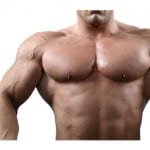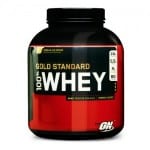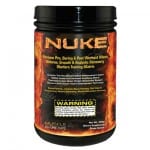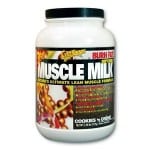 There are basically two camps when it comes to whey protein and muscle building supplements. One side swears by it, and the other says it’s completely useless, or even detrimental to muscle gain. They can’t both be right, so there has to be some middle ground and some products out there that will get you what you want, depending on what that is.
There are basically two camps when it comes to whey protein and muscle building supplements. One side swears by it, and the other says it’s completely useless, or even detrimental to muscle gain. They can’t both be right, so there has to be some middle ground and some products out there that will get you what you want, depending on what that is.
Overview
Muscle gaining supplements have been around for just about as long as body-building and weight training. It makes logical sense that if your body is going to be requested to lift heavy things, it will need some extra supplementation to keep it at its peak. But just how much is enough, how can you determine which products to take that suit your workout regimen? Depending on who you ask this answer can vary wildly.
Product Review Recaps
It’s no easy task sifting through all of the products out there that promise bigger muscles, or a cut look, increased power and stamina, or the ability to lift heavier weights during your workout. Our goal is to go one by one through some of the most popular products and find out the answer to the question that everyone really wants to know: does it really work, or not?

Optimum Whey Protein Recap
You may have seen the familiar tub of Optimum Whey Protein, it’s ubiquitous. It seems no matter which GNC you go to, there will be an entire shelf dedicated to just this brand. This leads many people to believe that it actually works and isn’t just a tub of powder.
But what’s the real story? Is this product true to its reputation, and will provide added benefits to resistance training? We did our homework and found out the real scoop on this very popular whey protein choice. Find out if you should take it, and if so whether you should take it before, during, or after your workout.
See our full review of Optimum Whey Protein

Muscle Warfare Recap
The makers of Muscle Warfare are declaring an all-out war against your body and its inability to create big, useful muscles. With interesting names such as Nuke and Napalm for their flagship products this is one company that’s walking on the edge in order to get people’s attention.
They specialize in creating what’s known as a stack, in which they combine powerful ingredients into one super system that’s designed to get your body out of its comfort zone so you can partake in extreme sports and training, pushing yourself to the next level.
See our full review of Muscle Warfare

Muscle Milk Recap
When it comes to Muscle Milk you either love it or you hate it. Some guys swear by it, while others say it’s just a bunch of junk marketed as a whey protein supplement. It does take up a lot of shelf space at many health stores, but popularity doesn’t mean that something works.
The first product they ever came out with was a pre-mixed supplement that you could find in the refrigerated section of the health food shop. Now they have branched out into meal replacement bars and similar products as their label has grown. Find out more about this growing trend below:
See our full review of Muscle Milk

RipFire Recap
If you don’t know anything about nitric oxide, then you might get caught up in all of the hoopla surrounding RipFire. They are hoping to educate people about how it works, and then getting them to believe that their product contains this substance and that it actually does all of the things they promise it can do.
But nitric oxide is not new to the bodybuilding community at large, and so this product is mostly geared towards newcomers that don’t know any better than to buy expensive, overpromising products like this. But could it actually live up to everything it says it can do?
See our full review of RipFire
The Claims from Whey Protein Manufacturers
The claim of most every whey protein manufacturer is that you will be able to enhance your gains in the weight room by drinking a protein shake before or after your workout. By using whey protein instead of animal or vegetable proteins, you’re able to utilize different chains of amino acids, which will help your body in the rebuilding process of making new muscle.
Because of this, you’ll be able to have bigger, stronger muscles by using these supplements. In addition, you’ll have wasted your time in the gym if your muscles do not have the essential building blocks to repair themselves. You’ll be more sore and take longer to recover from an intense workout if you don’t supplement with additional protein.
There are also lots of other claims made by companies that market products that are stronger than whey protein. Substances like creatine, or even more extreme ingredients like DHEA, promise nearly guaranteed results and add some science to back up their claims. These sort of supplements are usually more expensive than simple whey protein and are designed for serious bodybuilders that treat it like their main hobby, and not just something they do for fun or fitness.
The Hype
The hype comes from so many different people all recommending that you use whey protein if you’re lifting weights. Almost any fitness guru that has an exercise program will also be backing their own line of whey protein or other supplements. If you step into any GNC, all of the reps there will try to sell you a giant tub of it, and laud its effectiveness.
Even celebrities endorse it, even if they don’t mean to. When Hugh Jackman was beefing up for his role as Wolverine in the Wolverine movie, he had his favorite brand of whey protein flown to Australia so he wouldn’t miss a dose during training. And this stuff is the most sugary, lousy looking product ever – but he swears by it.
So how do you cut through all of this hype? Where can you get a straight answer from someone that doesn’t have a vested interest in selling you whey protein or other supplements? The answer is you have to look in unconventional places to get the other side of the story. If you ask an all-natural nutritional therapist what sort of supplementation you need in addition to the food you’re eating they may say that you don’t need any extra nutrients if you’re eating a proper diet. You might also be startled to find you actually don’t need to consume massive amounts of protein to get a nice, lean, muscular body.
The Costs
Whey protein varies in cost by manufacturer and by quantity. You can get a tub of low quality whey protein for about $20, or you can spend $60 and up to get the more expensive brands with all of their bells and whistles. When talking about other muscle builders, the price can get nearly astronomical, as you go deeper into the rabbit hole.
That’s why stacks are getting more and more popular. These combine ingredients that on their own are effective, but get even more so when combined with others. However, the danger with stacks is higher because less studies have been done on how the different ingredients interact with each other, and what effect they have on the body. Usually something that’s as effective as these will have side effects associated with it.
Follow the Money
There is a saying called “follow the money” which means if you want to find the answer to something just think about what motivates someone to do something. By telling people they need to consume X amount of protein when they’re on a workout program, you can create an entire industry around supplements that get them to that level. There is no money in telling people that a normal diet is sufficient. That’s why you’ll find few people promoting regular amounts of exercise and a healthy balanced diet.
The supplements cost pennies to create, and are sold for many tens of dollars. At the end of the day many of us are not pro athletes or fitness magazine models. Nor do we need to be in order to live life to the fullest, or attract the opposite sex. In fact, many studies have shown that women do not even prefer the look of a man that is a bodybuilder, some even calling it gross. But this is the ideal that many men shoot for, and of course the industry itself tries to get in on the brainwashing effect of society.
The Commitment
You have to not only be committed to a strenuous workout program that will rip up your muscles, but you also have to be committed to drinking whey protein shakes before or after the workout, or both. Since these aren’t always the best tasting shakes it can sometimes take a strong will to stick with it long enough to see results.
In some instances though, you can use whey protein to replace a meal, or as an additional meal so that you can boost your number of meals to 5 or 6 per day for a metabolism boost. Although eating this many times a day is actually bad for your digestive system. Your body makes digestive juices at certain times of the day, and it can only digest one thing at a time. When you start to eat your current meal, your stomach stops digesting your last meal, and that food gets left undigested.
Side Effects
With some supplements you also have to commit to dealing with any side effects that come with them. The body is a sensitive instrument and when you’re tinkering with it you might find that there are consequences to using it as a science experiment. The more extreme you go with the type of ingredients consumed, the higher your risk of adverse reactions that outweigh the positive benefits of larger muscles or a leaner body.
The Dangers of a High-Protein Diet
It doesn’t get very much press, but some people will tell you that you don’t really need that much protein in your diet in general. Just because you’re lifting weights doesn’t mean you have a protein deficit. There are even vegetarians they can build muscle that rivals some of the top bodybuilders out there.
When you overload your body with protein it is actually damaging to your liver. Your liver is one of the most important organs in the body. It regulates all sorts of things like digestion, and circulation. When you start mucking it all up with high amounts of protein the trickle-down effect is that other systems of the body start having problems.
It can also clog up other organs in your body, like your kidneys. So you can end up with excessive amounts of gallstones and kidney stones in your body that impede the natural flow of both digestive juices like bile, and wastes like urine.
The Dangers of High Intensity Training
The body isn’t meant to be punished, it’s meant to help you get through life and have the best life experience you possibly can. It doesn’t really need giant muscles, and these are rather unnatural unless you’re a gorilla. While it’s good to be fit and toned, taking it to extremes has its consequences both in the short-term and long-term. When you work out it is a good idea to only push your body to about half of what it could actually do. You don’t need to impress anyone, the goal is to be fit and healthy.
When you lift heavier weights, you stand a higher chance of being injured, or damaging your muscles beyond repair. There’s a fine line between doing enough damage to your muscles for them to gain in size, and doing so much damage to them that you actually tear the muscle to the point of no return. Once you injure yourself you’ll be unable to continue your workouts, defeating the purpose completely.
Evaluation
Almost any clinical study you find on whey protein will be slanted towards someone’s angle that has a vested interest in saying that it works. It’s really impossible to say if it does or not. The best way to find out for yourself is to start a weight lifting routine for one month, and if you’re not happy with the results you’re getting, start taking whey protein. If you notice an improvement, stay with it, but after another month if you still don’t see any results it probably doesn’t work for your body type.
Looking at the reviews of individual people is almost completely useless when it comes to figuring out if you should buy a certain brand of whey protein. You have to look at what the consensus says, and see if there is any overriding trend that you can analyze. The reason you can’t trust an individual review is because you have no idea what that person is like, what their history is with weight training, how they use the supplement, and what sort of program they followed. You also have no idea what other products they were taking in conjunction with the product they’re reviewing.
This is one of the biggest reasons why it’s hard to get a read on whether or not a bodybuilding or muscle building supplement works or not. The control group is hard to come up with, and it is unlikely that the subjects are only taking one thing at a time. Also, no one is regulating what sort of food they’re eating at the time they are taking the supplement.
Our Recommendation on Whey Protein
It’s hard to say whether whey protein works or not, because many body-builders use several different supplements at once, like creatine, and steroids. For the average person there’s not really a need to take whey protein, as it’s mostly promoted by those that have a vested interest in its sale. If you ask a true health care professional whether or not it is needed to see real muscle gain, they will tell you that there is not much nutritional value, and you can safely skip it.
Unless you are a hard core athlete training for a big event, you really don’t need why protein in your life. Stick with a moderate workout program and your muscles will grow at a natural rate. You won’t have to worry about losing your muscle mass, and spending all of that money on whey protein supplements, just to keep your muscles at their large size.